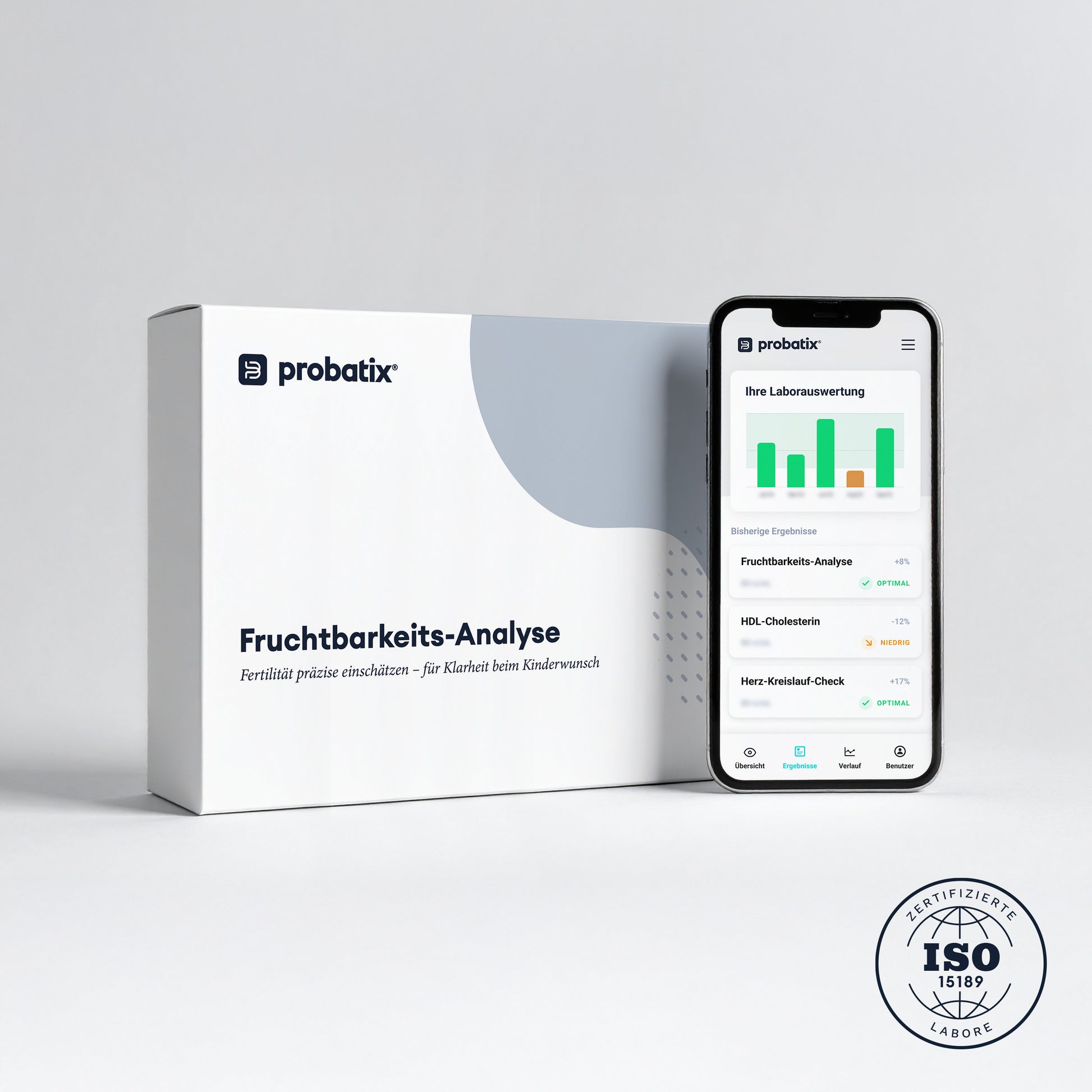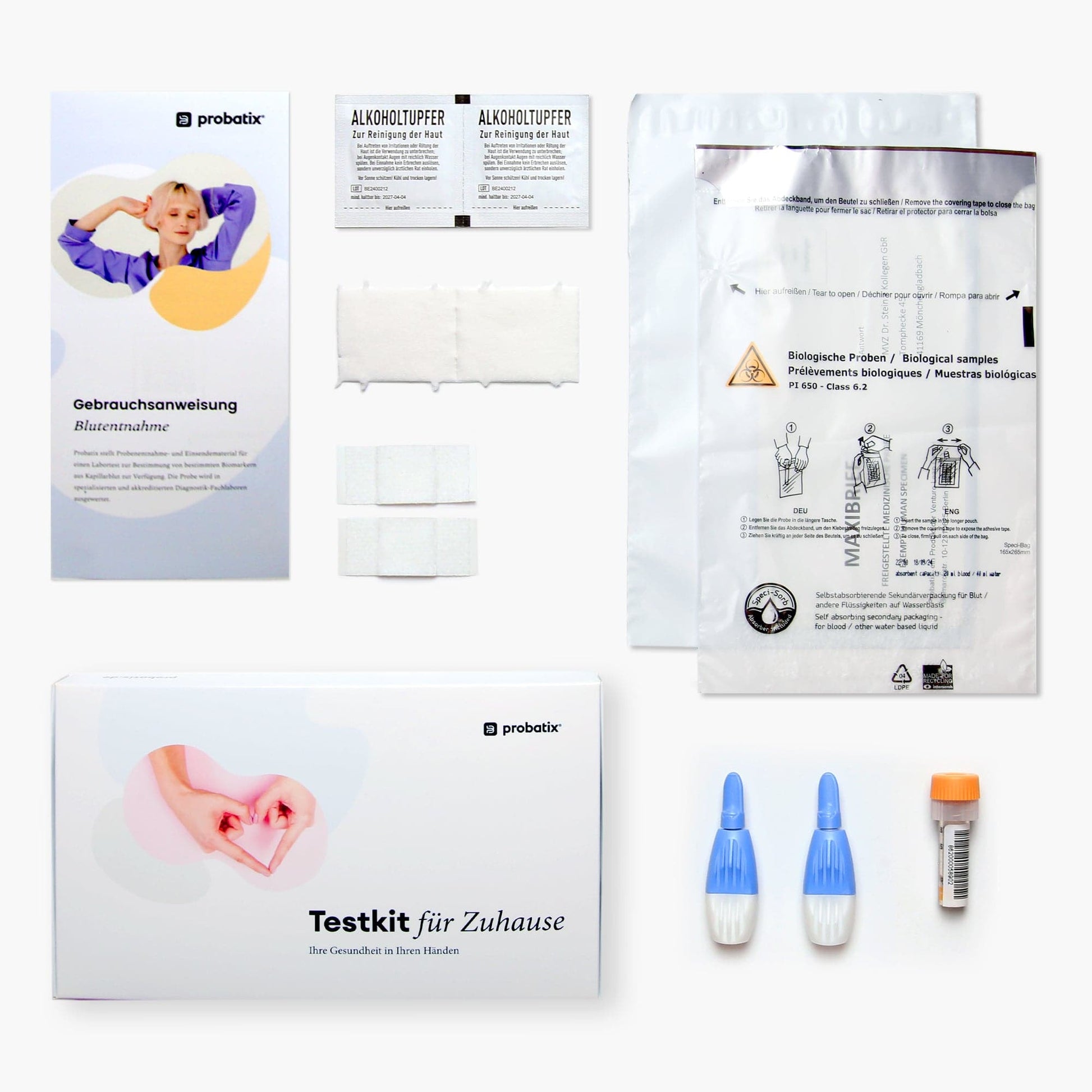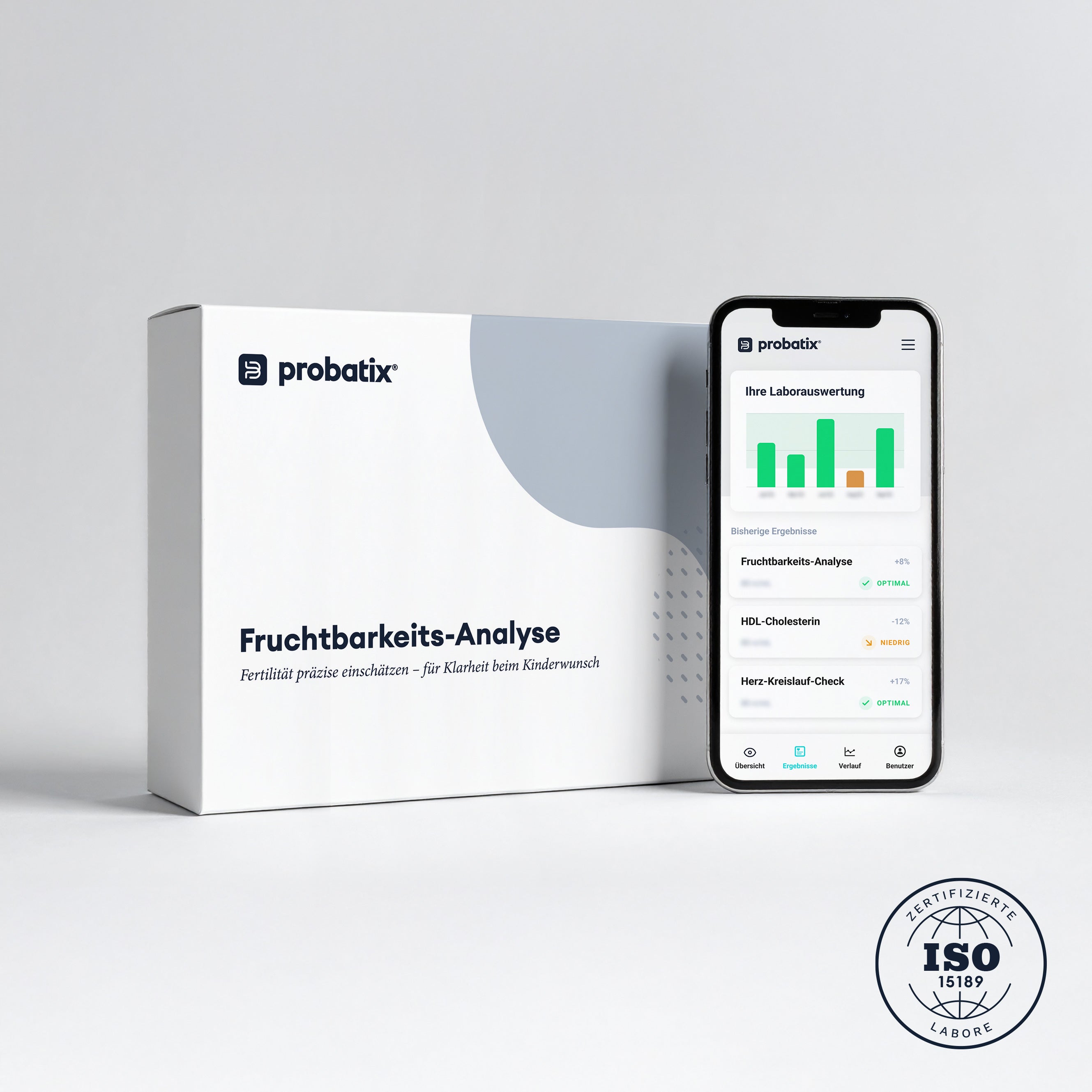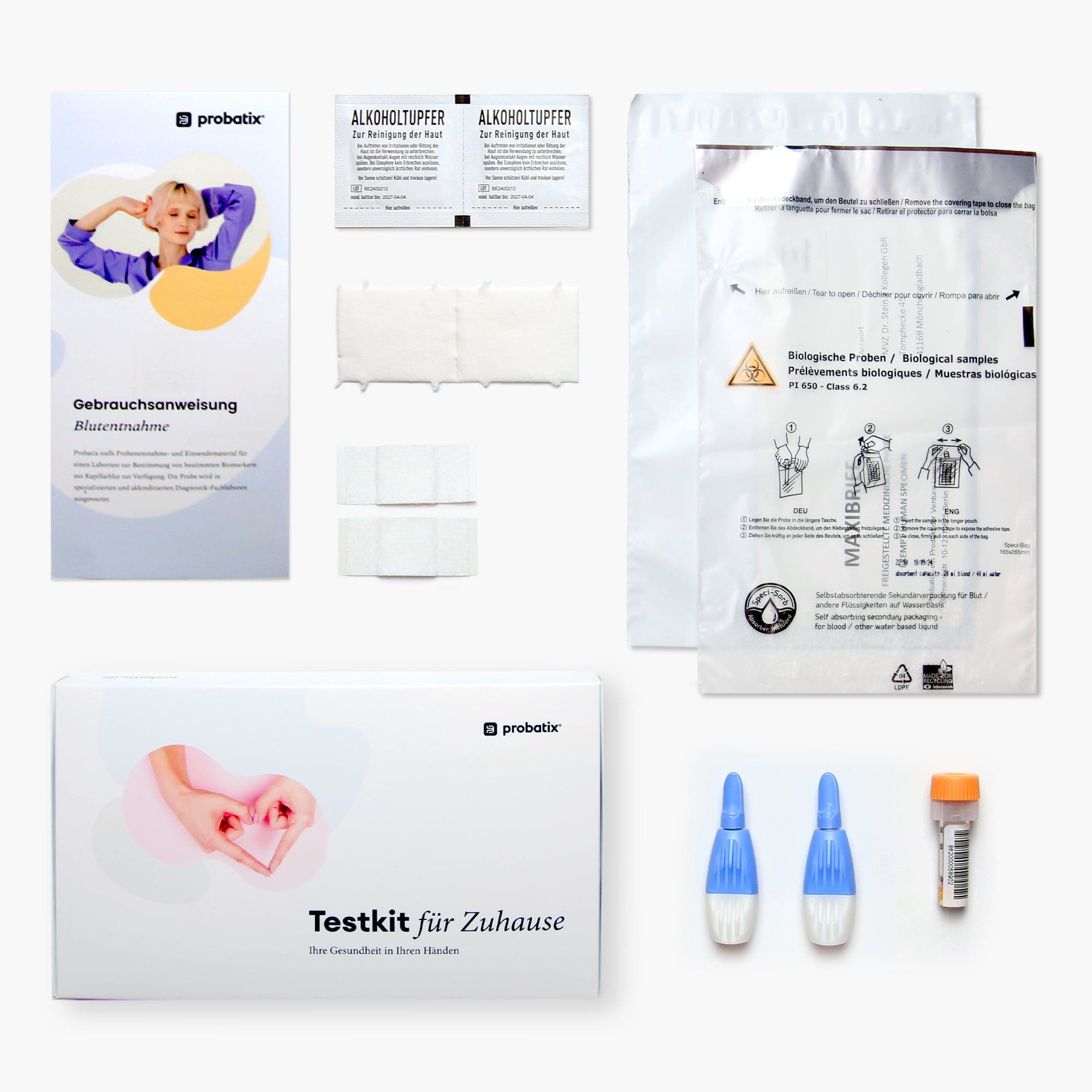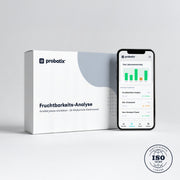Fertility Analysis
Fertility Analysis
A fertility test is an essential step to better understand your reproductive health and make informed decisions for your family planning.
With the Fertility Analysis for Women from Probatix, you receive a comprehensive analysis of your hormonal levels – conveniently and discreetly from home.
- Hormonal Analysis: Examination of AMH (Anti-Müllerian Hormone), Estradiol (E2), FSH (Follicle Stimulating Hormone), Progesterone (total), and Prolactin for a holistic assessment of your fertility.
- Simple && discreet: Sample collection conveniently at home with professional lab evaluation.
- Clear Feedback: Your values are clearly prepared and presented in comparison to the reference ranges.
Take the opportunity to understand your fertility early and make informed decisions.
Tip: Get a more comprehensive picture of your female hormones with our Women's Hormone Profile.
In Stock
What values does this test measure?
What values does this test measure?
Further information on the values can be found here.
How does it work?
How does it work?
1. Take a sample with our test kit
2. Send the sample to the lab using the prepaid envelope
3. View results digitally after a few days
Why are the values reliable?
Why are the values reliable?
All tests offered by us are evaluated and validated in certified medical laboratories in Germany.
This is what the press says about our tests
Fertility Analysis: All details about the test
What benefits does this test offer me?
What benefits does this test offer me?
Your family planning begins with clarity – learn more about your fertility.
The At-home Fertility Analysis for Women offers you a detailed examination of your key hormonal values: Anti-Müllerian Hormone (AMH), Estradiol (E2), FSH (Follicle Stimulating Hormone), total Progesterone, and Prolactin. These values provide valuable insights into your fertility and help you make informed decisions for your family planning.
Your benefits of the fertility analysis at a glance:
- Comprehensive results: Analysis of key fertility hormones in certified laboratories.
- Simple and discreet: Sample collection conveniently and calmly from home.
- Time-saving: No long waiting times – results are available in a few days. html
- Clear Feedback: Your individual report is available online and shows your values compared to the reference ranges.
Take the first step for your family planning – with the Fertility Analysis from Probatix.
Attention: This is a fertility test for women. For an accurate assessment, specifying the cycle day is crucial. This test is not suitable for men.
What do the measured values mean?
What do the measured values mean?
Estradiol (E2) is the most important estrogen in the body and plays a central role in fertility and the female cycle. It is predominantly produced in the ovaries, and in smaller amounts in the testes and adrenal glands in men. Estradiol also influences bone metabolism, the skin, and the cardiovascular system.
High estradiol levels can be found, for example, during ovulation, pregnancy, or hormone therapies. Low levels occur during menopause and can be associated with symptoms such as hot flashes, sleep disturbances, or bone loss.
Anti-Müllerian Hormone (AMH)
The anti-Müllerian hormone (AMH) is produced in the testes in men and in the ovaries in women. In male embryos, it ensures that the Müllerian ducts regress, while female embryos have only very low AMH levels, allowing the uterus and fallopian tubes to develop.
In women of reproductive age, the AMH level serves as a measure of the so-called ovarian reserve – a high value means that many eggs are still present; with increasing age, the level decreases and falls to zero with menopause. AMH measurements are primarily used in fertility treatments to estimate the number of available eggs and to plan hormone dosing. The test is also used to detect premature transition to menopause and to diagnose polycystic ovary syndrome or certain ovarian tumors.
Follicle Stimulating Hormone (FSH)
FSH (Follicle Stimulating Hormone) is produced in the pituitary gland and plays a central role in fertility. In women, it stimulates the maturation of follicles in the ovaries, while in men, it supports the production of sperm in the testes.
Elevated FSH levels may indicate that the ovaries or testes are no longer functioning adequately, as is the case during menopause, for example. Low levels are more indicative of a disorder in the pituitary gland or the overarching hormonal system.
Prolactin
Prolactin is a hormone produced in the pituitary gland. It plays a crucial role in the development of the mammary glands and in milk production after birth. Even outside of pregnancy and breastfeeding, prolactin can be detected in the blood.
Elevated prolactin levels can lead to menstrual cycle disorders, infertility, or milk flow without pregnancy. In men, elevated levels often manifest as potency disorders or reduced sexual drive. Low levels are rare and usually of little significance.
Progesterone
Progesterone is a central hormone of the female cycle. It is produced after ovulation in the corpus luteum of the ovaries and ensures that the uterine lining is prepared for a possible pregnancy. If fertilization occurs, the progesterone level remains high and is later maintained by the placenta.
If progesterone is lacking or the level is too low, it can lead to cycle disorders, difficulties in the implantation of an egg, or early miscarriages. Elevated levels occur naturally during pregnancy but can also arise outside of it due to hormonal disorders, cysts, or rarely, tumors.
Why is this test important?
Why is this test important?
A fertility test for women is an important step in assessing reproductive health and identifying potential issues early. It can reveal hormonal disorders such as PCOS and help determine the optimal time for conception. The results assist you in planning your family in a timely and informed manner.
When should I take this test?
When should I take this test?
The fertility analysis can be useful in the following situations:
- In case of difficulties getting pregnant
- Before starting fertility treatment
- With irregular menstrual cycles
- If hormonal disorders are suspected
- For a general assessment of fertility
Consult a doctor or a reproductive specialist to discuss the results and create an individual plan.
What is included in the test kit?
What is included in the test kit?
Where can I find the instructions?
Where can I find the instructions?
Bei Fragen hilft Ihnen auch immer gerne unser wunderbarer Support weiter: support@probatix.de
FAQ - More Frequently Asked Questions about the Test
FAQ - More Frequently Asked Questions about the Test
1. What is tested in the fertility analysis?
The fertility analysis measures important hormonal markers such as Anti-Müllerian Hormone (AMH), Estradiol (E2), Follicle Stimulating Hormone (FSH), Progesterone (total), and Prolactin. These values provide information about your egg reserve, cycle progression, and possible hormonal imbalances.
2. Who is the fertility analysis suitable for?
The test is suitable for women who want to better understand their fertility – whether for family planning, investigating unfulfilled desire for children, or checking hormonal status.
3. How does the test work?
The procedure involves a simple blood sample, which you can conveniently take from home. Your sample is then professionally analyzed in a certified laboratory.
4.When should the fertility analysis be conducted?
The ideal time is on the 2nd to 5th day of the menstrual cycle, as hormone levels are particularly informative during this phase. For an accurate assessment, it is important to provide the day of your cycle.
5. How long does it take to receive the results?
The results are usually available within a few days and can be viewed in your personal Probatix dashboard.
6. What do the results indicate?
The results show whether your hormone levels are within the normal range and provide insights into your fertility. In case of deviations, you will receive clear recommendations for possible next steps or a medical consultation.
7.Can the fertility analysis be useful even without a desire for children?
Yes, even without a current desire for children, the test provides valuable insights into your hormonal health and can help detect disorders early.
8. What role does the AMH level play?
The Anti-Müllerian Hormone (AMH) provides information about the egg reserve. A low level may indicate a lower egg reserve, while a higher level may suggest better fertility.
9. How does age affect fertility?
As age increases, fertility decreases because both the quantity and quality of eggs decline. The fertility analysis helps to realistically assess the current state of your fertility.
10.Can the fertility analysis help in preparing for fertility treatment?
Yes, the test is often used before fertility treatment to better assess the chances of success and to plan the treatment individually.
Das sagen unsere Kunden
Your benefits for your health
Test with minimal effort
Understanding Your Own Health
Recognize changes early
